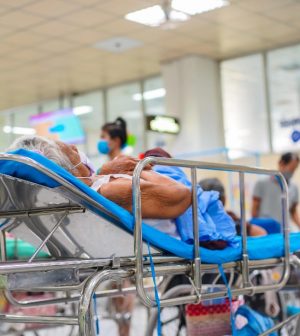- Could Your Grocery Store Meat Be Causing Recurring UTIs?
- Are You Making This Expensive Thermostat Error This Winter?
- Recognizing the Signs of Hypothyroidism
- 10 Strategies to Overcome Insomnia
- Could Artificial Sweeteners Be Aging the Brain Faster?
- Techniques for Soothing Your Nervous System
- Does the Water in Your House Smell Funny? Here’s Why
- Can a Daily Dose of Apple Cider Vinegar Actually Aid Weight Loss?
- 6 Health Beverages That Can Actually Spike Your Blood Sugar
- Treatment Options for Social Anxiety Disorder
Stroke Recovery Could Depend on Where You Live

For stroke survivors, the relative affluence of their neighborhood could be a factor in how well and how soon they recover, new research shows.
Compared to Americans living in better-off locales, those living in areas plagued by high unemployment, lower levels of education, poor housing and low income had higher risks for a poor post-stroke recovery a year after the attack, the study found.
“The magnitude of this impact is what was most surprising,” said study lead author and Yale School of Medicine postgraduate researcher Leah Kleinberg.
“We did not expect a large disparity in outcomes, yet we found patients in the most economically disadvantaged areas were twice as likely to have unfavorable outcomes,” she said in a news release from the American Heart Association.
Her team is slated to present its findings next week at the American Stroke Association’s annual meeting in Phoenix.
The study is based on data collected between 2018 and 2021 as part of the Yale Longitudinal Study. It tracked outcomes for stroke survivors admitted to the Yale Health System, collecting data at three months, six months and then each year after hospital discharge.
For nearly 2,200 of these patients, zip code data was available. Patients averaged 69 years of age, with about 15% of the population being either Black or Hispanic.
Patients’ levels of stroke-related disability were ranked on a standard scale.
Kleinberg’s team found that, one year after surviving their stroke, nearly half (46%) of patients living in what the researchers classed as a “high-deprivation” area still had a poor recovery from the disabling attack.
That’s compared to the 40% seen among folks living in intermediate deprivation neighborhoods and 35% for those residing in the most affluent areas, the researchers said.
A “poor outcome” in stroke recovery was defined as the patient still requiring assistance for some of the tasks of daily living. Good outcomes meant the person might still face some residual effects of their stroke, but they were able to live independently, the researchers said.
“This research was inspired by the people I work with daily,” Kleinberg said. “Although stroke patients from differing socioeconomic backgrounds often have similar functional status at discharge, outcomes can vary dramatically a year later. As a clinical research associate, I get to interact with them far beyond the completion of their urgent treatment, which sparked my interest in exploring the long-term outcomes for these patients.”
Dr. Elizabeth Jackson is immediate past chair of the AHA’s Committee on Social Determinants of Health, as well as the director of the Cardiovascular Outcomes and Effectiveness Research Program at the University of Alabama at Birmingham.
In the AHA news release, she said that everyday factors, such as “access to quality care, nutritious foods, stable housing or other basic health needs are crucial for people recovering from stroke.”
But living in areas of “social vulnerability” can make these resources tougher to find, Jackson said, so “unfortunately, these data are not surprising.”
Because the findings were presented at a medical meeting, they should be considered preliminary until published in a peer-reviewed journal.
More information
Find out more about stroke rehabilitation and recovery at Johns Hopkins Medicine.
SOURCE: American Heart Association, news release, Feb. 1, 2024
Source: HealthDay
Copyright © 2026 HealthDay. All rights reserved.










